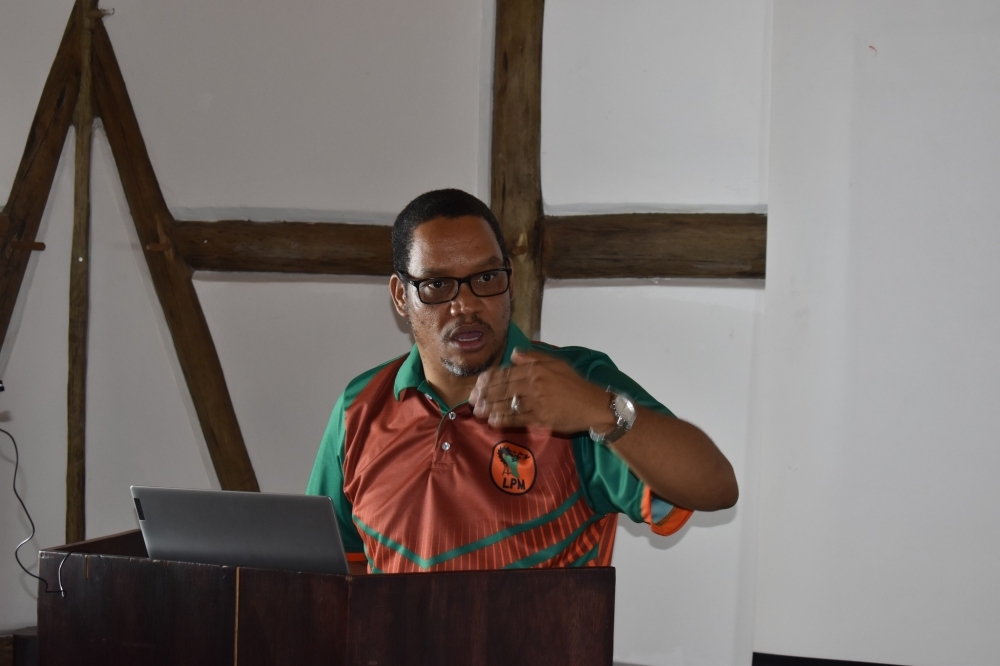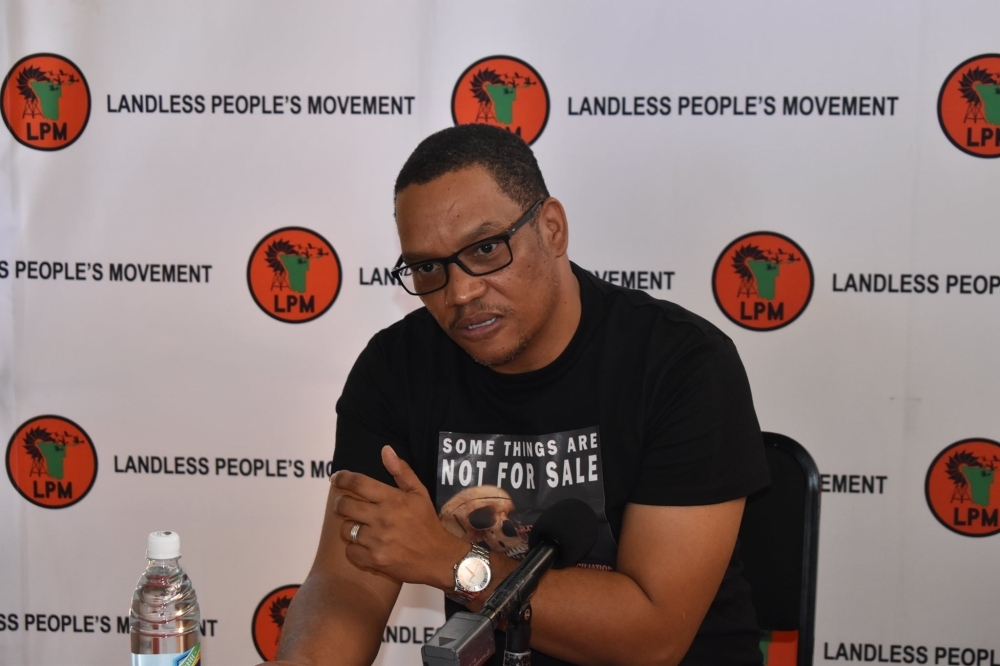Govt sued over N$18bn genocide package
Lawmaker Bernadus Swartbooi, the Landless People’s Movement (LPM) and 11 traditional authorities from affected communities of the Nama and Ovaherero genocide have brought a High Court application seeking to nullify the controversial joint declaration between Namibia and Germany.
As part of the deal, the German government agreed to pay Namibia 1.1 billion euros (N$18.6 billion) in projects over 30 years for the reconciliation and reconstruction of communities affected by the Nama-Herero genocide of 1904 to 1908 as a form of reparation.
While the Namibian government has heralded the deal as a major breakthrough after years of back-and-forth negotiations, the affected communities have called it an insult.
No basis
According to Swartbooi, the Speaker of the National Assembly Peter Katjavivi had no basis to rely on when he noted the joint declaration in parliament and further played a part in depriving parliament the opportunity to meaningfully debate it.
He urged the court to declare Katjavivi’s conduct unlawful, and to set aside the joint declaration based on it not being ratified in line with the standing rules of the house.
Further, he wants the court to declare the agreement inconsistent with the provisions of the Namibian Constitution as well as the 2006 house motion on genocide.
‘Unlawful’
“The joint declaration is not a meaningless international statement, it has domestic application and an adverse effect on citizens’ rights - to the point that it has made a policy choice which has never been debated or otherwise scrutinised by parliament or anyone outside the executive at all,” Swartbooi said.
“Government does not have the inherent power to unilaterally make laws, even on an international plane that has a direct impact on what happens to citizens - that is a substantive law-making power that is the preserved for parliament,” court papers read.
Swartbooi said the joint declaration is unlawful, further alleging that Katjavivi’s decision to merely note the declaration in parliament was beyond his powers.
According to him, the position that the joint declaration represents a policy choice determines future relations between Namibia and Germany regarding the genocide and further creates a development fund in place of the payment of reparations.
“It was established without the participation of those directly affected by the tragic events of [the genocide], or the Namibian public in general or at all.
“The joint declaration, thus, purports to settle the issue of the genocide in principle and chooses its modality: It restricts what form of redress can be pursued by Namibians domestically,” he said.
Subject to judicial review
According to him, had this decision been made solely at the behest of the Namibian government - for example by passing a domestic law that foreclosed on reparations without German involvement - there would be no question that such conduct would be subject to judicial review.
He accused government of flouting the constitution and said the results thereof would have direct, external, legal effects.
The lawmaker emphasised that the Namibian people suffered and still suffer from the aftershocks of colonialism, adding that the unilateral choice imposed on the country by government in the absence of parliamentary debate undermined parliament’s ability to satisfy its obligation to protect previously disadvantaged Namibians.
“No legally competent choice of this kind could be made by excluding parliament. Parliament cannot fulfil an obligation where it is given no meaningful opportunity of participation or debate. This only becomes worse when parliament is properly viewed as the people’s representatives, with competency for determining laws and consequences on the domestic plane,” he said.
Accountability
According to Swartbooi, parliamentarians are being denied their right to hold the executive accountable.
“What this honourable court can do, and, with respect, must do, is hold the government accountable when its conduct violates the constitution and is contemptuous of parliament itself.
“Should the court not intervene... the case... for meaningful restitution of Namibia’s first nation people, encompassing the preservation of ethnic memory and group identity, would be lost.”
[email protected]
As part of the deal, the German government agreed to pay Namibia 1.1 billion euros (N$18.6 billion) in projects over 30 years for the reconciliation and reconstruction of communities affected by the Nama-Herero genocide of 1904 to 1908 as a form of reparation.
While the Namibian government has heralded the deal as a major breakthrough after years of back-and-forth negotiations, the affected communities have called it an insult.
No basis
According to Swartbooi, the Speaker of the National Assembly Peter Katjavivi had no basis to rely on when he noted the joint declaration in parliament and further played a part in depriving parliament the opportunity to meaningfully debate it.
He urged the court to declare Katjavivi’s conduct unlawful, and to set aside the joint declaration based on it not being ratified in line with the standing rules of the house.
Further, he wants the court to declare the agreement inconsistent with the provisions of the Namibian Constitution as well as the 2006 house motion on genocide.
‘Unlawful’
“The joint declaration is not a meaningless international statement, it has domestic application and an adverse effect on citizens’ rights - to the point that it has made a policy choice which has never been debated or otherwise scrutinised by parliament or anyone outside the executive at all,” Swartbooi said.
“Government does not have the inherent power to unilaterally make laws, even on an international plane that has a direct impact on what happens to citizens - that is a substantive law-making power that is the preserved for parliament,” court papers read.
Swartbooi said the joint declaration is unlawful, further alleging that Katjavivi’s decision to merely note the declaration in parliament was beyond his powers.
According to him, the position that the joint declaration represents a policy choice determines future relations between Namibia and Germany regarding the genocide and further creates a development fund in place of the payment of reparations.
“It was established without the participation of those directly affected by the tragic events of [the genocide], or the Namibian public in general or at all.
“The joint declaration, thus, purports to settle the issue of the genocide in principle and chooses its modality: It restricts what form of redress can be pursued by Namibians domestically,” he said.
Subject to judicial review
According to him, had this decision been made solely at the behest of the Namibian government - for example by passing a domestic law that foreclosed on reparations without German involvement - there would be no question that such conduct would be subject to judicial review.
He accused government of flouting the constitution and said the results thereof would have direct, external, legal effects.
The lawmaker emphasised that the Namibian people suffered and still suffer from the aftershocks of colonialism, adding that the unilateral choice imposed on the country by government in the absence of parliamentary debate undermined parliament’s ability to satisfy its obligation to protect previously disadvantaged Namibians.
“No legally competent choice of this kind could be made by excluding parliament. Parliament cannot fulfil an obligation where it is given no meaningful opportunity of participation or debate. This only becomes worse when parliament is properly viewed as the people’s representatives, with competency for determining laws and consequences on the domestic plane,” he said.
Accountability
According to Swartbooi, parliamentarians are being denied their right to hold the executive accountable.
“What this honourable court can do, and, with respect, must do, is hold the government accountable when its conduct violates the constitution and is contemptuous of parliament itself.
“Should the court not intervene... the case... for meaningful restitution of Namibia’s first nation people, encompassing the preservation of ethnic memory and group identity, would be lost.”
[email protected]






Comments
Namibian Sun
No comments have been left on this article